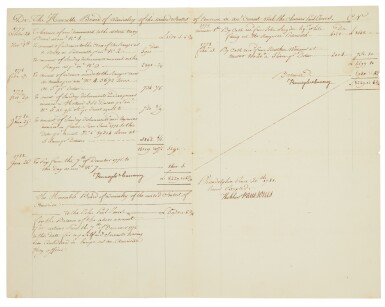Fine Books and Manuscripts, Including Americana. Part 2
Fine Books and Manuscripts, Including Americana. Part 2

Jones, John Paul | A very fine example of John Paul Jones's rare "Chevalier" signature
Lot Closed
July 20, 07:57 PM GMT
Estimate
25,000 - 35,000 USD
Lot Details
Description
Jones, John Paul
Manuscript receipt signed ("The Chevr. Paul-Jones") as Continental Navy Captain, being a settling of his accounts with the Board of Admirality of the United States
2 pages written continuously across the inner forme of a bifolium (302 x 390 mm; watermarked Pro Patria | D & C Blauw), Philadelphia, 26 June 1781, written in a very neat clerical hand, headed "The Honorable Board of Admirality of the United States of America in Acct. With the Chevalier Paul Jones," twice annotated by Jones "Pennsylv. Currency," docketed on verso, "No. 3. Voucher No. 11"; some very minor, scattered spotting, but unusually fresh condition. Red Morocco folding-case, chemise.
When John Paul Jones returned to America in February 1781 following his successful command of Bonhomme Richard, he had received from Louis XVI a decoration of "l'Institution du Mérite Militaire," a sword, and the title Chevalier. The United States quickly acted to bestow every honor that Congress could provide; on 14 April he was commended by Congress for his deployments on Ranger, Bonhomme Richard, Alliance, and Ariel. In June he was chosen to command the America, a new 74-gun ship being constructed at Portsmouth. Jones spent the next year supervising that work, but by the time that the America was ready to be launched, Congress had decided to present the vessel to their French allies (as compensation for the wrecked Le Magnifique) rather than use it for the Continental service. Jones's friend Robert Morris failed to find him another command. Thus, just as news came of peace talks in Paris that could cut short chances for more naval glory and more prize money, Jones found himself without a ship.
It was at the beginning of this period that the present accounting was submitted by Jones to the Board of Admiralty for "rations from the 7th of December 1775 to this date for my self and servants having been considered in Europe as an American Flag Officer," showing a balance due to Jones of £5930.6 ¾, "Errors Excepted." Most of the expenses occurred when Jones was commanding Ranger.
Samuel Eliot Morison, the naval historian, wrote to a previous owner of this document, "You are to be congratulated on acquiring one of the rare 'Chevalier' signatures. Jones started signing himself that way after receiving l'Ordre de Merite Militaire with grade Chevalier (the English 'Sir') from Louis XVI. He did not use it long because (I guess) people kidded him about it in the U.S."
After the command of America fell through, Jones received Congressional permission to sail as an observer with the fleet of the Marquis de Vaudreuil to obtain "military knowledge in order the better to serve my country when America should increase her navy" (letter to Robert Morris, 19 November 1782, quoted in De Koven, Life and Letters of John Paul Jones, vol. 2:225). But when Jones reached Philadelphia after this voyage, he found that Congress was not yet ready to consider any sort of permanent naval establishment. As prize money from his European exploits had not yet arrived, he could not indulge his fantasies of life as an American landed gentleman. Instead, he sailed again to Europe, this time to expedite recovery of the money due him for his prizes. Although he would visit America briefly in the summer and fall of 1787, Jones's career as an American sailor was over. Indeed, aside from a brief period of service to the Russian Empress, his time as an active officer in any navy had ended. All that remained were medals and memories of his days aboard the Ranger, and the Bonhomme Richard in those glory days when he rendered far more than "acceptable Service" to the American republic.
PROVENANCE:
James Lorimer Graham Collection (Parke Bernet, 29 April 1958, lot 206) — Joseph M. Roebling (Sotheby Parke Bernet, 28 April 1981, lot 85)
